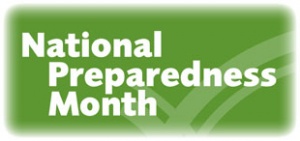 In September the federal government gives preparedness enough of a nod that it gets it’s very own month; though you rarely hear them say much more than: “Get a kit. Make a plan. Be informed.” Of course if everyone did at least that we, as a national population, would be much more prepared to cope with future disasters.
In September the federal government gives preparedness enough of a nod that it gets it’s very own month; though you rarely hear them say much more than: “Get a kit. Make a plan. Be informed.” Of course if everyone did at least that we, as a national population, would be much more prepared to cope with future disasters.
The media has also been talking about preparation, this time in a non-mocking tone. As Hurricane Isaac approached, CNN.com published an article, Keep a hurricane preparation checklist. It begins:
In areas where hurricanes can strike, it’s a good idea to have a closet or an area set aside for storm preparedness storage. There, you can keep items you’ll need in case disaster strikes suddenly or you need to evacuate.
And while this is great advice, what about everywhere else? Aren’t all areas susceptible to having a “disaster strike suddenly”? I think it’s interesting how the media portrays prepping–just prior to an incoming disaster (i.e. hurricane, snow storm, forest fire)–as completely common sense. “Of course you’d want to be prepared, you’d be a fool not to”, they imply. They include a completely practical list of supplies and recommendations of what to do prior to the arrival of the storm.
But what about the disasters we don’t see coming? The ones that give us no notice? No one should need to tell us that every day we need: food, water, shelter, security, and energy. So why not have backup supplies for these daily basic needs, insurance if you will, just in case a disaster strikes without warning? We are all expected, and it’s considered normal, to have home insurance, car insurance, health insurance, and life insurance but we know those preparations are very rarely used (hopefully). So why, when you incorporate being prepared into your daily lifestyle, are you frequently labeled as being on the fringe or a bit of a kook?
So this month, consider using the government’s endorsement of preparedness as an opportunity to talk about prepping with skeptical friends (family). As winter approaches we all tend to think a little more about being prepared; everyone knows that winter storms can knock out power and/or leave us homebound for several days. “Did you know September is National Preparedness Month?” would be an easy way to broach the topic, and then follow-up with something like “If a [fill in the blank disaster] happened here, and you weren’t able to get to the store for several days, how would your family hold up?” Then listen. Commend them on the things they have done or are doing, even if it’s relatively minor. Don’t overwhelm them with everything they SHOULD be doing. Instead, give them one or two ideas for ‘next steps’. If you push too hard then they’ll just push back — and close down to the idea completely. Take this time to plant a seed in their mind. Then live your life as an example.
(Wednesday: A new monthly contributor will be introduced, Rural Relations with Josh, will write about: Lessons Learned, An Introduction)
